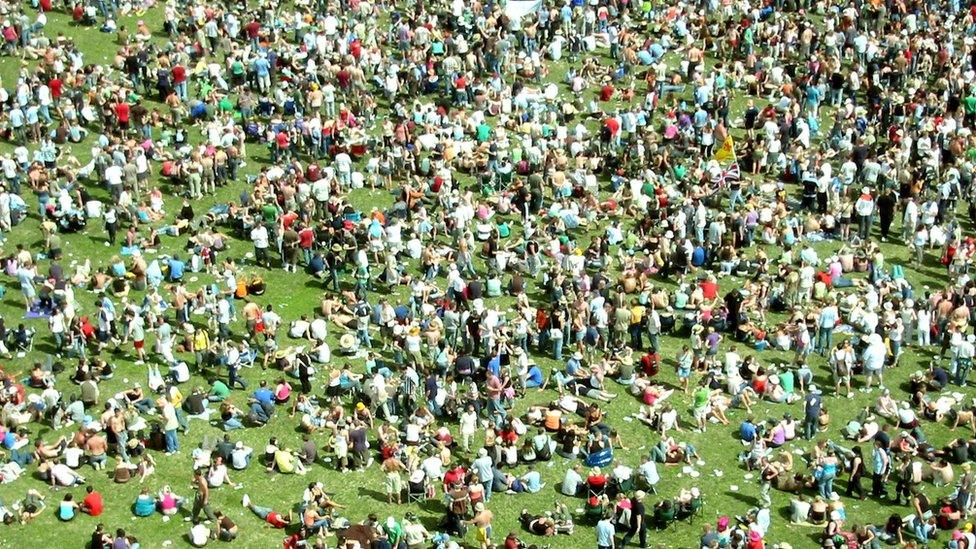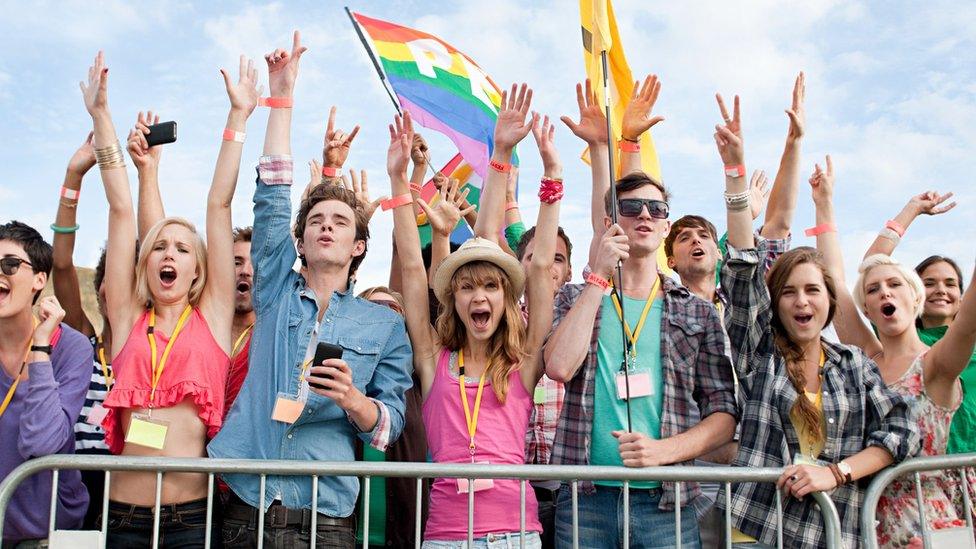How likely are you to bump into a friend at a music festival?
- Published

Where's my mate Peggy? She was here a minute ago
You're in a big field with 50,000 people, or 100,000 people - are you going to meet anyone you know?
There are two ways of thinking about this - are you trying to find someone or is this just about chance meetings?
It could be day three of the festival, the battery on your phone has run out and you're desperately trying to find the person you came to the festival with, because they've got your wallet. Or is this just about whether you're going to see a friendly face?
The seminal work on finding a friend at a festival, external came from Nathan Cunningham, a PhD student in the statistics department at University of Warwick.
His big question was that if you're looking for a friend you know is moving around the festival site, are you better off staying still and waiting for them to find you or should you go and look for them yourself.
He built a simulation in which a festivalgoer is looking for a friend in a square-shaped site, changing direction on about 5% of steps and when they reach the boundary of the field. The friends are assumed to have found each other if they get within 15 steps of each other.
He ran this simulation for different-sized festival sites and for all of them found that you were better off moving around than staying still.
On a square site 200 paces long, it would take a median average (that's the number of paces for which half the simulations take more and half take fewer) of about 1,000 paces to find a moving friend, while someone staying still would be found after their friend had taken an average of more than 1,500 paces.
The other insight was that you should try to avoid changing direction if possible - a completely erratic search would take 50% longer than a composed one, he found.

So that's valuable advice, but the Reality Check team was also interested in how likely you are to randomly bump into somebody you know at a festival.
We've been helped with this question by Deirdre Toher, from the University of the West of England's applied statistics group. UWE's campus in Bristol is less than 30 miles from Glastonbury. She is an enthusiastic festivalgoer but is more likely than usual visitors to bump into someone she knows because she tends to organise volunteers and has been involved in projects measuring festivals' use of generators.
Clearly, your likelihood of bumping into an acquaintance is linked with how many people there are on the site that you know. If you are attending a festival, then you are already more likely to have acquaintances on the site because you are more likely to associate with people who will attend and you might have met people at previous events.
Deirdre used a slightly different approach, based on the probability that the next person you see will be someone you know.
The next question is how many steps you take in a day. Deirdre said her fitness tracker at last year's Glastonbury had registered between 32,000 and 35,000 steps a day, which is a lot, especially as she spent some of the day working in an office.
She said something closer to 18,000 would be consistent with a festival on a smaller site.

Has anyone seen Barry?
We're assuming crowd density of one person per square metre - four per square metre is what you get in a mosh pit, so you're not going to get freely moving people at that density.
At one person per square metre, for every metre you walk, you see about two people whom you couldn't see before.
There isn't a Glastonbury Festival this year, so consider a reasonably big festival such as Reading or Leeds, where there are about 100,000 people - about half the number at Glastonbury.
If you know one other person in the crowd and you walked 18,000 steps in a day, your chances of bumping into them would be about 11%.
So if you know 10 people in the crowd, your chances of bumping into one of them increases to about 70%.
If you wanted to have a 50% chance of meeting someone you know during the day, then you'd need to know about six people in the crowd.
As the distance you cover decreases, it becomes considerably less likely that you'll bump into someone you know. So, if you're covering only 10,000 steps, then you would need to know 11 people before you had a 50% chance of meeting one of them.
So, the advice is, if you want to randomly bump into people you know, walk around as much as you can - otherwise, you'd better arrange a meeting place in advance.



- Published4 January 2017